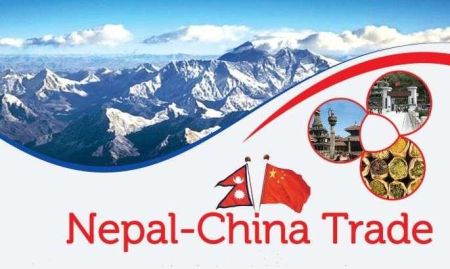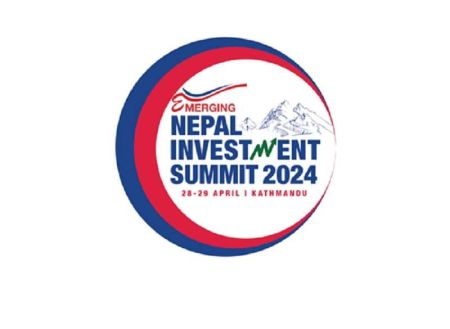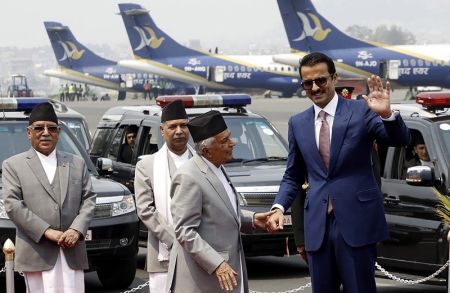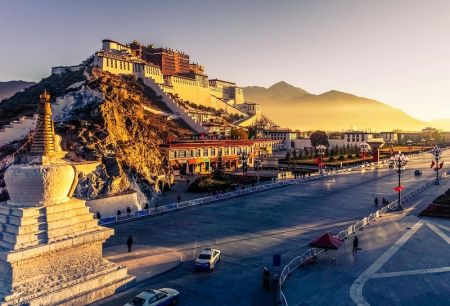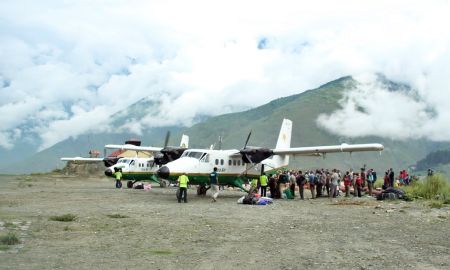(1).jpg)
--By Achyut Wagle
The outcome of the second election to the Constituent Assembly (CA) comes as no respite to both, Nepal’s economically debilitating political instability and prolonged transition that has greatly weakened the sovereign authority as an independent nation state. This fate was uncalled for but not unexpected. But what was unexpected as well as unwanted were the irresponsible behaviour of the so called major political parties - Nepali Congress, CPN-UML, UCPN-Maoists and newly emerged RPP-Nepal, after the people’s fresh mandate.
Even after more than a month of official results of the first-past-the-post elections were out, these parties were not able to fill in their proportionate representation quotas of CA members. The factions in all these parties, headed by powerful leaders, were in dog-fight to reward their cronies over the ones from rival faction in the financially lucrative positions of CA membership. Some party offices like of RPP-N were even vandalized by the mob of competing group of aspirants. Apparently, no party has defined criteria for selecting these CA members. Such system was deliberately avoided by the influential leaders for any rule-based system would substantially reduce their discretionary power and in turn would make aspirants more loyal to the party concerned and the system than the leader. Incessant such practice across the board is one of the thorny impediments to institutionalizing democracy in the country.
At the another layer of squabbles, the focus of the first and second largest parties in the new CA, Nepali Congress and the CPN-UML, seem more immediately focused on power-sharing arrangements than putting concerted efforts to first activate the CA proceedings as soon as possible. Surprising and rather misplaced was UML’s bargaining to change the President, over and above the priorities of first writing constitution without disturbing the relative stability provided by composed personality of Dr Ram Baran Yadav as the President and second filling the long vacant elected government at the local levels, before upsetting any functional political institutions.
Equally shameful is the bickering in Nepali Congress, the largest party emerged, to choose a prime ministerial candidate from among three -- Party President Sushil Koirala, Senior Leader Sher Bahadur Deuba and Vice-president Ram Chandra Poudel. Again, question of rule is cardinal here. All three leaders want to make an arrangement to fulfill their own vested interests by indulging into tug-of-war without rule. If they cannot agree on to a power-sharing deal, they can immediately invoke the process of electing the Parliamentary Party Leader in a democratic way. And, everyone should accept the outcome. It is as simple as that! But, everyone is seeking settlement out of the parliamentary party and yet not agreeing to a deal acceptable to all. A few quintessential personalities in the Congress leadership are indulging in power-sharing negotiation with other parties or factions of their convenience without institutionally deciding on the formal course of action. The furore expressed in the post-poll Congress central committee meeting on this lacuna is testimony to the deficit of democracy in the oldest democratic party of the nation.
The UCPN (Maoists) reduced to the third force from the first in the last CA is yet to recover from debacle shocks, although it has substantially mellowed down from its a month old position of summarily boycotting the new CA process. By demanding a separate probe in detriment to the existing constitutional provisions into alleged poll rigging ‘designed to defeat the Party’, it had strategically wanted to render the Constitutional Court, thereby entire judiciary, as a redundant entity. But such a probe mechanism is unlikely to come, even if some placating scheme were to be worked out to satisfy their hurt ego.
It is no surprise that the UCPN (Maoists) have now made up their mind to accept the election results as there was no other alternative left if they were to remain in open, competitive politics. But, the party’s maneuverings and tantrums are still akin to that of a rebel force and an irrational opposition. In fact, by these tactical moves, its President Prachanda has saved himself from a situation of humiliatingly relinquishing all important party positions taking moral responsibility of the debacle. Had it been any other non-regimented party or a democratic country, such a norm of taking moral responsibility in such situations is but a natural imperative. Nepal apparently lacks this culture, therefore, the democracy here is always fledgling, hardly ever marginally institutionalized. Some of its recent public postures like ‘sitting in the opposition in CA’ are absolutely ridiculous as there will be no ruling and opposition in the CA. Every member is expected to and ensured of an intellectually independent contribution in finalizing the provisions to be included in the new constitution.
Another Maoist outfit led by Mohan Baidya, which was ab initio out of the CA election process, has finally vowed ‘not to stand even facing the CA’. This declaration rules out possibilities of including them too in the new constitution making process through CA. What would Baidya group do now on? In fact, it has not much alternative left than to act as a nuisance in the process and perish with time as it neither has a clear political roadmap nor does it follow a defined and workable political doctrine. But, to be able to actually trivialize the existence and influence of the forces like of Baidya, three major parties, Congress, UML and the UCPN (Maoists), and perhaps RPP-N, must work with more magnanimity, pragmatism and sense of responsibility; taking a clear departure from the current lingering, blame-game, backbiting, bickering and blackmailing. If not, Baidya’s claim of futility of even the second CA will be vindicated, circumstantially.
It is a fact that the country can’t do without a government. But, that was not the whole objective of the CA election, that too for the second time. Equally, it is also the fact that people have not given mandate for any party to form a majority government. Therefore, the posturing of any party as the ‘game changer’ is just a bogus egotism. Also, the weight every party is putting to have its upper hand in the government does not go with their uniform claim of completing the constitution writing within one year. Were they sincere to it, all parties, or at least big three, would have instantly agreed to a consensus government with representation proportionate to their strength in CA for a year, promulgate the new constitution by then and begin a newer round of political competition. But, this benign feature is not visible even in the distant horizon of Nepali politics. As such, Nepali politics, unfortunately, has once again reverted back to dirty power-games where parties are ready to change their bed-fellows overnight, ethical and moral standards are low and democratic practices are shadowed by all and sundry alike. This in essence has been the prostitution personified in politics.
Under the new power equation, many analysts have batted for a Congress-UML coalition government, even if the Maoist and the fourth force of royalists, RPP-Nepal, opted to remain out of the government. But, this perspective has two inherent difficulties. This view emanates from the thinking that if the two largest forces join in the government, the constitution making might get easier. First, the very premise of this thinking is flawed, because until the parties could view the CA process (the constitution writing) differently from the legislative process (forming the government), Nepal is absolutely unlikely to get the new constitution, ever. Second, when two parties with combined majority of almost two thirds in the House are in the government, other smaller parties are likely to act more destructively in both - legislative parliament and the CA. And, the third, although the ideological distance between the Congress and the UML is the narrowest among the parties, practically they have traditionally seated more on opposite benches than being cordial alliance partners. Either of them has seen their respective future assured at the cost of other. That is not unnatural when Nepal ultimately lands in the universal two-party trend, with one centre-left and the other centre-right, ruling the roost at least in the long run.
For all these reasons, at present, the Congress-UCPN (Maoist)-RPP (N) coalition, along with other possible forces included but sans UML, appears more appropriate. Because, leaving both extreme right RPP (N) and extreme left Maoists outside of the government would make them more irresponsible and situation may easily slip out of control, mainly in the constitution writing process. But, leaving the UML out of the bracket has lesser risk as a large, relatively more mature force. It cannot act so irresponsibly even being at the opposition and its stance on new constitution are fairly rational. On the other hand, forces like Maoist would feel their wound of defeat partly healed for being able to be part of the government, making the sail easy.
In any circumstances, the parties have no option of acting more responsibly both to form the government and re-initiate the CA process from the point where it was left by the previous CA. Deepening of democracy, spatially, parties within and without, is crucial for both short and long run interests of the country’s political process. Relegating the democracy, its values and norms on the back burner, and putting other political issues like single identity-based federalism, one-Madhesh-one-province etc. on the front will never complete the constitution writing process, let alone its peaceful promulgation to the satisfaction of every citizenry.
(The writer is former editor of Aarthik Abhiyan National Daily.)






